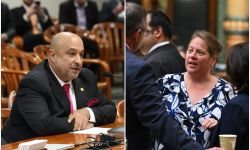Elissa Slotkin winning over Senate donors. Her challenge: Win over Black voters

- U.S. Rep. Elissa Slotkin is the frontrunner in Democratic U.S. Senate field
- She’s facing challenges from Detroit actor Hill Harper and business executive Nasser Beydoun
- Michigan’s open Senate seat considered a tossup race in November
When U.S. Sen. Debbie Stabenow announced her retirement and sent shockwaves through Michigan politics last year, the speculation over who might take her place on the Democratic ticket started almost immediately.
That chatter quieted down significantly once U.S. Rep. Elissa Slotkin said she was in.
Since her first run for Congress in 2018, the former CIA analyst and Department of Defense official has developed a reputation as a formidable fundraiser who can win competitive seats.
Slotkin’s Democratic rivals contend she’s not doing enough on issues that matter to Michigan voters, including economic and racial injustice, housing, clean water access and meaningful action to stop violence in Gaza.
Related:
- Trump ‘warrior’ Mike Rogers takes flak in Michigan GOP primary for U.S. Senate
- 2024 Michigan elections updates
- Ask Bridge Anything About Politics
- 2024 Michigan Voter Guide
- Who’s running for U.S. Senate in Michigan
Some say she has work to do to connect with Black voters in communities like Detroit, which she has never represented. And she’s already taking shots from Republicans like Donald Trump, the former president and presumed nominee, who calls her a “far left liberal.”
But with millions in the bank and a double-digit lead in the polls, Slotkin appears to be the clear frontrunner in the Democratic primary against actor Hill Harper and business executive Nasser Beydoun, observers say.

“These primaries are essentially over on both sides,” said Adrian Hemond, founder and CEO of the Lansing-based consulting firm Grassroots Midwest, who also referenced GOP primary frontrunner Mike Rogers.
“Congresswoman Slotkin has all the money, most of the endorsements and a statewide campaign operation, and her putative primary opponent does not,” he said.
Still, it’s a long road ahead for Slotkin in a state where the general election is expected to be a tossup, President Joe Biden’s popularity is flagging and fissures persist among key voting blocs frustrated by a lack of Black representation or discontent with U.S. involvement in the Israel-Hamas war.
Slotkin is traveling to Detroit early and often but said her underlying strategy hasn’t changed much from her winning campaigns in hotly-contested Congressional districts: introduce herself repeatedly, practice “radical transparency” with voters and take nothing for granted.
“The minute you sleep on Michigan, it's going to swing the other way,” she told Bridge Michigan. “So we have a lot of work ahead of us.”
‘Real representation’
Slotkin, Harper and Beydoun were the only Democratic candidates to file signatures required to make the primary ballot after Stabenow’s surprise retirement announcement made the seat a top target for Republicans.
Slotkin has polled well ahead of her opponents, leads the field in name recognition among voters and is currently dominating the fundraising game across both parties, raising $4.4 million and reporting $8.6 million in reserves as of last month’s quarterly campaign finance update.
Harper, an actor and author known for his roles on "The Good Doctor" and "CSI: NY," reported raising about $358,000 over the same time period and had just over $441,300 left in the bank. Beydoun brought in $172,855 and had $148,700 in reserves.

So far, Slotkin is the only candidate with “the level of organization, the level of financial support that you’d expect to see from a winning statewide campaign,” said Richard Czuba, a longtime Michigan pollster and founder of the Glengariff Group Inc.
Slotkin said one of her main focuses is addressing the “over the top” costs of child care, education, housing, health care and prescription drugs, noting that “if you’re not talking about the economy and the future of work and the middle class, you’re only having half the conversation.”
She’s also concerned about ongoing access to reproductive rights at the federal level, arguing that Michigan’s 2022 passage of state-level abortion rights could be jeopardized by future federal restrictions.
But her opponents contend Slotkin missed multiple chances to address voter concerns during her nearly six years in Congress.
“There’s so many people that don’t feel represented, they don’t feel that Washington is actually helping them, they think it’s actually hurting them,” Harper said in a recent campaign video. “They want real representation.”
Beydoun told Bridge he believes Michigan voters are “waking up” to U.S. foreign policy shortfalls amid the ongoing Israel-Hamas war and would support his platform of downsizing funding for foreign wars to invest in domestic interests such as health care and education.
Slotkin, who supported Congress’ recent foreign aid package but has called on Israel to address the ongoing humanitarian crisis in Gaza, acknowledged that the conflict is “roiling our state” and said she’s spent considerable time meeting with groups on both sides of the issue.
“I hear so many of the same feelings and frustrations and pains from groups that are on very different sides of this conflict,” she said. “I try and be aware and present for any conversation I have with people, even when we don't always agree, and I think that's my job…That doesn't mean it's easy.”
The Detroit factor
Much of Slotkin’s primary focus is centered around the city of Detroit, a heavily Democratic and majority Black region capable of making or breaking Democrats’ chances in the general election.
It’s a place where Slotkin, who hails from northern Oakland County and represents a swath of mid-Michigan in Congress, hasn’t previously had to court votes or build community relationships.
That’s meant at least 90 appearances so far in the city and more coming, according to her campaign.
“I know that I've never represented the city of Detroit, and it's on me to show up, introduce myself, listen, and then keep coming back,” Slotkin said. “I am completely aware that it is on me to earn people's votes, and that's what I'm trying to do.”
Harper has made inroads among prominent Black officials in metro Detroit, picking up endorsements from Wayne County Executive Warren Evans and former U.S. Rep. Brenda Lawrence, a Southfield Democrat who at one point considered running herself if no other African-American candidates were in the race.
Evans, in particular, has been critical of Democrats’ engagement with Black voters in Wayne County, writing in a recent Detroit Free Press column that Democrats up and down the ticket could be in peril if their votes are taken for granted.
The split points to “the undercurrent of a lack of Black representation” in Michigan, said Michael Griffie, a Detroit attorney and consultant who in 2022 ran for Michigan’s 13th Congressional District.
After Lawrence’s departure from Congress and U.S. Rep. Shri Thanedar’s victory in 2022, Michigan was left without a Black Democrat in Congress for the first time in decades — the state’s only sitting Black federal lawmaker is U.S. Rep. John James, R-Shelby Township.
Because Slotkin doesn’t have roots in Detroit, Flint, Saginaw or other Michigan communities with large African-American populations, some of those primary voters may gravitate towards Harper, Griffie said.
But, he added, Harper and Beydoun “have not done much” to penetrate Slotkin’s frontrunner status.
‘Everything is going to matter’
Among general election voters, Slotkin is polling just ahead of Mike Rogers, a former congressman who is the frontrunner in the four-candidate Republican primary, according to an April Glengariff Group poll commissioned by the Detroit Regional Chamber.
Republicans generally view Slotkin as the Democrat to beat and think they can do it, pointing to Rogers’ similar experience with winning competitive congressional elections. One strategist called a hypothetical Slotkin-Rogers matchup a “clash of the titans.”
Trump, who has endorsed Rogers, slammed Slotkin earlier this month in a Saginaw County rally, suggesting she would be a rubber-stamp for Biden-backed policies in the Senate.
“A vote for Slotkin is a vote to raise your taxes, kill Michigan manufacturing jobs and flood your communities with illegal aliens and a lot of Chinese-built electric vehicles,” Trump told a crowd of conservatives in Saginaw County earlier this month.
Much of what happens in the general election will ultimately come down to the mood of Michigan’s independent voters, turnout among key constituencies and what happens in the expected Biden-Trump rematch, observers told Bridge.
“Michigan is going to look like a Jenga game, and by that I mean every piece is going to either help you win, or it's going to collapse the entire thing for you,” said Czuba, the pollster. “Everything is going to matter.”
Former Michigan Gov. Jim Blanchard, a Democrat and self-described “big, big fan” of Slotkin, told Bridge the stakes are high in a state that will ultimately come down to a few percentage points.
But he’s confident Slotkin’s record, campaign work ethic and her willingness to listen to a “really diverse group” of Democratic coalitions will put her over the top.
“We've got to elect really thoughtful, well informed people, and Elissa Slotkin is a very thoughtful, reasonable, well informed person,” he said. “She's not in this to give performances.”
Democratic candidates for U.S. Senate
Elissa Slotkin: Slotkin has served in Congress since 2019 and currently represents Michigan’s 7th District. She previously worked as a Department of Defense official and analyst for the Central Intelligence Agency. Born in New York but raised in Oakland County, Slotkin has degrees from Cornell and Columbia universities.
Hill Harper: An actor known for his roles on “The Good Doctor” and “CSI: NY,” Harper is also an attorney, single father, author and coffee shop owner. The son of two doctors, Harper was born in Iowa and moved to Detroit in 2016. He is a graduate of Harvard University. A cancer survivor, Harper in 2012 was appointed to a cancer panel by then-President Barack Obama.
Nasser Beydoun: The Dearborn businessman is a restaurant owner and former chair of the American Arab Chamber of Congress. Beydoun describes himself as a political moderate and civil rights advocate. He is the son of a Lebanese immigrant who found his footing in Michigan as a UAW member, according to Beydoun's campaign.
See what new members are saying about why they donated to Bridge Michigan:
- “In order for this information to be accurate and unbiased it must be underwritten by its readers, not by special interests.” - Larry S.
- “Not many other media sources report on the topics Bridge does.” - Susan B.
- “Your journalism is outstanding and rare these days.” - Mark S.
If you want to ensure the future of nonpartisan, nonprofit Michigan journalism, please become a member today. You, too, will be asked why you donated and maybe we'll feature your quote next time!




